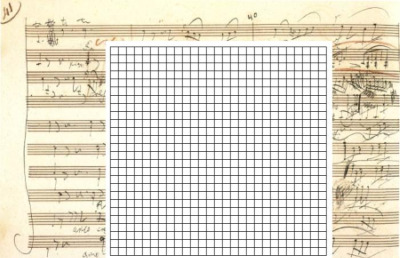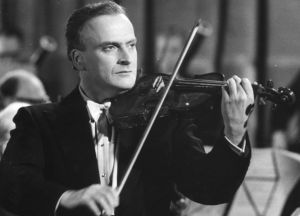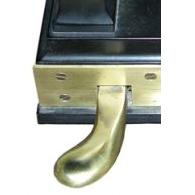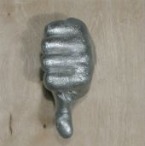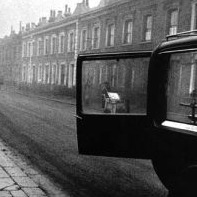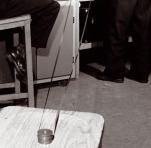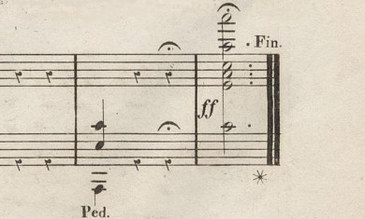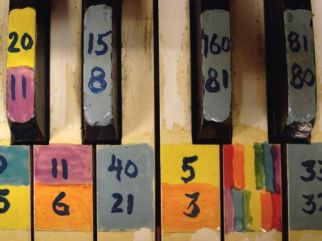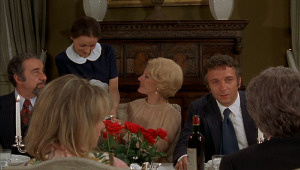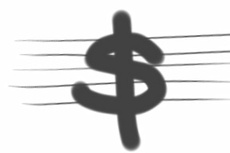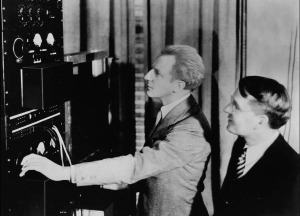By the later 20th Century, the performance of classical music -- for orchestra, also chamber music, and solos -- was dominated by pervasive strong regular beat. Emphasis on beat-regularity is the outcome or reflection of several musical and societal changes, among these mass production, the standardization of time keeping (time zones), the metronome, sound recording, the ascent of conducting, more emphasis on "full" scores, the practice of … [Read more...]
Archives for 2010
What Would Yehudi Do?
Perhaps we receive our most important education from models around us. We emulate them. And if we don't imitate behavior details, we may take on the approach or method of someone we admire. Vicarious models can be important. At 14, I devoured Arthur Rubinstein's My Young Years. I loved it more than Mr. Rubinstein's playing that I heard on recordings. The book seemed to offer a complete how-to-live prescription to a young pianist -- or young … [Read more...]
Two Rooms, NYC
To have lived in grander rooms, I sometimes think, would have been -- well, grander. Until I walk into my other room, quickly come to the piano and see the window I looked out of, as I learned Brahms's Concertos. … [Read more...]
No pedal
By some, it's considered a mark of distinction to play J. S. Bach's music on the modern piano using no pedal. Glenn Gould often did. Several of my students have aspired to. It seems like it must be harder to play that way, more pure, more noble. And the harpsichord has no such device for extending sound -- so perhaps it's more "authentic" to eschew the pedal in old music? I always use the pedal. Perhaps judiciously or even undetectably -- to … [Read more...]
Faulty
In recent reviews, I've read about the structural shortcomings of Robert Schumann's Humoreske and the emotional emptiness of Pierre Boulez's piano sonatas. When I proposed a complete performance of Messiaen's Catalog of the Birds in Boston some colleagues told me it wasn't good music. Let's be cautious about reaching such judgments. Just because we have not yet heard (or given) a performance that makes sense of a scripted piece -- I don't … [Read more...]
Casualties
What leads to professional success as a musician? Talent matters. The ability to hear and feel and think. Digital dexterity. Work. Perhaps luck, or chance, or random events play their parts in many careers. And there are other elements of "talent." Some artists interest us. The sounds they make compel. We want them around, we want them to be part of our life. There are so many young musicians of real ability and achievement who do not make … [Read more...]
Declassified
You might drink some exceptional wine from a highly-prized and highly-priced vineyard in Burgundy. But if you're in the know or lucky, this vin might come labeled simply as "Bourgogne" and cost 10 euros instead of hundreds. The wine has been "declassified." Sold as something more generic and less valuable that what it really is. Government regulations in France and elsewhere stipulate how much can be produced and labeled from the most … [Read more...]
Loopy
Walking down the sidewalk, I sometimes fasten on a phrase from a classical piece in my mind's ear. I make it into a loop. Over and over I hear it, hum it, sing it, effectively turning the bit of music by Beethoven, or Mozart, Gershwin, Schoenberg, or Radiohead into minimalism. I go through the phrase dozens of times. I'm stuck on it and in it -- an obsessive, vastly-extendable run-on sentence, an earworm. Did people used to do this? Strolling … [Read more...]
Quick and Dead
There I was in the green room, about to play at the Gilmore Festival. Included on the program was Chopin's Polonaise-fantaisie -- music I've performed, coveted, engaged with, grappled with for 30 years. Over time, I've exorcised, from my playing of the piece, the details and atmosphere of Vladimir Horowitz' 1966 recording. (The sounds that were my first contact with this music.) Lately, I've been trying to construe the Polonaise-fantaisie's … [Read more...]
Next
"You can't play the next note until you finish this one." Obvious, yet how often classical performers truncate or even skip something. Particularly in anxious moments, or when difficulties, or the unexpected occur, the musical equivalent of a syllable or even a whole "word" is dropped or omitted. A musical score is an order of events. Rhythm and speed may be indicated, but most significantly we read that the soprano voice resolves from C to B, … [Read more...]
Clubbing
Not an habitué of nightclubs, boîtes, or other dens of musical iniquity -- I have played 4 times at New York's Le Poisson Rouge since it opened. In case you didn't know, this is the "it" place of the new millenium. A club (in the expensively refurbished premises of the former Village Gate) where music, high-toned classical, alt classical, and bands comingle, and drinks are served. It's caught the attention of the Establishment. Countless mentions … [Read more...]
Virtual Instrument
notes on my program at the Gilmore Festival last week The piano has always been a virtual instrument. "Virtual" in the sense that for a phrase the keyboardist could sing, or dance, or speak -- by turns, taking on the musical or expressive persona of an Italian coloratura soprano, a violin virtuoso, a country dancer, a marching soldier, or then a whole orchestra, or a madrigal group reading from part books. Robert Schumann commented that … [Read more...]
The Discreet Charm of the Musical Middle Class
In Pennsylvania, at Bucknell University I had my first outing with Nico Muhly's new piano piece, Drones & Piano. Shhh -- don't tell. This was a "pre-premiere." The premiere will take place at the Gilmore Festival on May 7. (The Gilmore commissioned the new piece.) I will play Drones & Piano in at least four public performances (Smith College, Holy Cross, Bucknell) before the "premiere." That makes sense, and it's duplicitous. Maybe … [Read more...]
Money changes everything
There are American music schools where students don't pay tuition. They're free. The Curtis Institute in Philadelphia, the Colburn School in Los Angeles, the graduate program at the Yale School of Music. Of course, admission to these programs is especially competitive. How much should young musicians have to pay to study? Once, at my school, a prospective student from a very well-off family was awarded a full scholarship based on her merit. A … [Read more...]
Product and Act
Let's not make a categorical distinction between 19th-century musical products -- publications for sale to a public of amateur players -- and the recorded musical products of the 20th and 21st centuries. The work of the "composer" notating sonatas for sale to ladies of the bourgeoisie is the same work as that of performers and producers of 20th-century sound recordings. Both endeavors are musicking, both bring a public into the process/experience … [Read more...]

